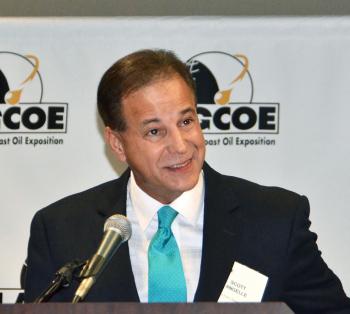
Angelle: Energy growth is a stimulus all its own
Thu, 2013-10-24 14:00
Harlan Kirgan
It’s nothing short of a game changing, seismic shift.
Lafayette, La.
By ZACHARY FITZGERALD
The U.S. oil and gas industry is seeing a seismic shift due to new technology being used in the Gulf of Mexico, and the nation needs to implement public policy that continues to allow access to domestic natural resources, Scott Angelle, Louisiana Public Service District 2 Commissioner, said Wednesday.
Angelle spoke at the Louisiana Gulf Coast Oil Exposition in Lafayette.
More than 400 exhibitors from across the region and from outside the country were in the Cajundome, its convention center, and grounds.
The exposition began Tuesday and ends today.
Oil and gas employment has risen 38.6 percent since 2007, he said. Without energy employment the American economy would be “more so in the ditch than it is today,” Angelle said.
“It’s nothing short of a game-changing, seismic shift” due to hydraulic fracturing, horizontal drilling and deepwater technology, Angelle said.
Angelle serves 13 parishes as a public service commissioner, including St. Mary Parish.
The U.S. needs to work to institute public policy that makes affordable natural resources possible, Angelle said. Affordable energy is what led the way for expansion following World War II, he said.
The biggest challenge of today’s generation is to convince public policy makers that the “rising tide” coming out of the investment in the oil and gas industry is a sustainable tide, Angelle said. The government does need to regulate the industry, “but regulation that leads to strangulation is not smart public policy,” he said.
The Energy Information Administration released a report recently that stated that the switch from coal-run power plants to natural gas-run power plants is the reason for a 3.8 percent drop in U.S. carbon dioxide emissions in 2012, Angelle said.
This year, for the first time since 1995, the U.S. will produce more oil than it imports. Fracking and horizontal drilling have helped drive a 58 percent increase in natural gas reserves since 2007, cut natural gas prices by about 75 percent, and sparked more than $120 billion of U.S. based investment in 2012, Angelle said.
Two years ago, the U.S. became a net exporter of petroleum products and now are the largest exporter of petroleum products in the world, he said.
The country needs to focus on the “three Es,” a balance of energy, environment, and economy, he said.
People in the oil and gas industry have been “defined as people who don’t care about the environment,” Angelle said. “I’m sure everyone over here prefers to drink clean water and breathe clean air, and, yet, we let people define us.”
After the Deepwater Horizon oil spill in 2010, Gov. Bobby Jindal asked Angelle to be the “point man” to get the drilling moratorium lifted as lieutenant governor.
Three years after the spill and the moratorium, the industry has demonstrated that “deepwater is back,” Angelle said. More oil and gas rigs are in use in the Gulf of Mexico than at the time of the blowout.
In 2008, $11.9 billion in capital expenditures were spent in the Gulf of Mexico. That number shrank to $6.5 billion in 2010. In 2013, the industry is on pace to spend $15.7 billion.
Angelle quoted an Energy Information Administration report that stated, “This is a remarkable turn of events. This is a new era of thinking about new market conditions and opportunities you wouldn’t think about in a million years.”
In 2003, former Federal Reserve Chairman Alan Greenspan told Congress the country did not have enough natural gas to fuel the economy, and the U.S. needed to embrace permitting and importing of liquid natural gas from other countries, Angelle said.
“Less than a decade later, we are sitting on a 100-year supply of natural gas ... and are now seeking to export it,” Angelle said.
As crude oil prices rise due to “over the top regulation and restricted access to resources” so goes the downward performance of the economy, Angelle said. “I think we saw that; we lived it in 2008,” he said with crude oil prices rising to $149 a barrel in July 2008.
The country should be focused on energy security for the average American, Angelle said.
The newly found sources of domestic oil and natural gas are adding more than $1,200 to the discretionary income of the average U.S. family. “That sounds like a stimulus plan with no cost to the taxpayers,” he said.
About 75 percent of that $1,200 comes from savings in lower electricity bills. Angelle said. “Every American who has a climate-controlled home is directly connected to a strong oil and gas industry.”
- Log in to post comments
